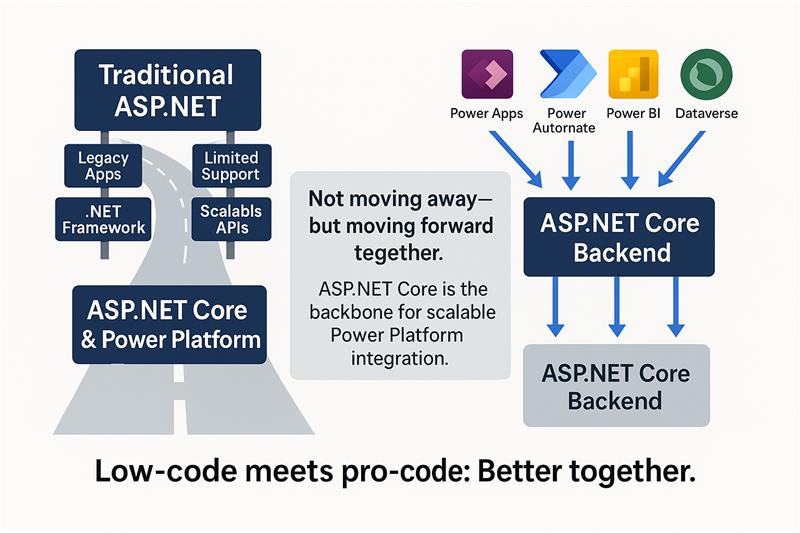It’s not that Microsoft is removing ASP.NET completely. What they are doing is upgrading the Power Platform to work with ASP.NET Core instead of the older ASP.NET version.
How ASP.NET Core connects to the Power Platform?
Custom Connectors via ASP.NET Core :
With Visual Studio, it’s easy to create connectors from your ASP.NET Core APIs to use in Power Apps and Power Automate. This is a powerful feature leveraged by Microsoft Power Platform consultants to deliver custom business app development. Whether you’re looking to hire a Power Automate expert in London or invest in Power Platform consulting services in the UK, this integration simplifies the process.
New development starts with .NET Core.
Microsoft has shifted future investment towards .NET Core (now simply “.NET,” versions 5+), including ASP.NET Core. They don’t introduce big new features to the old .NET Framework devblogs.microsoft.com+1reddit.com+1 anymore. Tooling further encourages migrating legacy ASP.NET to Core with upgrade strategies using Blazor, YARP, and System. Web adapters learn.microsoft.com. These technologies are essential for custom app development with Power Apps and enabling Power Apps automation experts to modernize business infrastructure.
Power Platform works in tandem with .NET
Developers build the logic or data-handling part (called an API) using ASP.NET Core and create a custom connector. It acts as a link between Power Apps and the backend, so Power Apps can send or receive data using the API.. You can also implement business logic in Azure, Dataverse plugins, or Power Fx while still leveraging traditional C#/.NET for advanced scenarios. This kind of collaborative setup works incredibly well for Microsoft Power Platform experts across the UK, especially for Power Apps consultants based in London. It gives developers the ability to design systems that are ready for expansion and future challenges. Power Platform integration specialists can fully leverage this architecture to create results that evolve alongside your business.

Your question: “Is ASP.NET being replaced in the Power Platform?”
Short answer: No.
- Instead, Microsoft is embracing ASP.NET Core (the newer version of ASP.NET) as the best way to build strong and reliable APIs.
- It won’t replace your .NET skills—they’re still highly relevant. The trend is integration: build APIs with ASP.NET Core and surface them in Power Platform via connectors. Power Apps developers apply efficient techniques to make apps run smoothly and quickly.
- Low-code platforms like Power Apps let you build apps faster with little coding — especially for simple things like user interfaces (UI) and basic workflows.
But for more advanced logic, heavy data processing, or large-scale systems, you still need professional coding — like ASP.NET Core, which handles the backend and complex services.
The Power Platform isn’t pushing .NET developers to the side; it’s using their work even more. Build APIs with ASP.NET Core, expose them via custom connectors, and use Power Apps/Automate or Power Fx to create value faster.
These days, businesses in London and across the UK are really focusing on digital transformation—and many are turning to affordable Power Platform consulting and trusted, certified Microsoft Power Platform experts to guide them through the process and help bring their ideas to life. Industries like finance are quickly adopting the Power Platform for finance and operations in London, using Power Apps to streamline workflows and automate everyday processes.
At the same time, demand is rising for Power Platform support services for small and mid-sized businesses (SMBs) across the UK. Many businesses are now using the Microsoft Power Platform to build custom apps that fit their specific needs. Often, they do this with Power Apps training and hands-on help from experts.
Use Power Apps for the front end (what users see), and ASP.NET Core for the back end (the powerful engine behind the scenes). Together, they give you fast, flexible, and scalable business apps. Using Power Apps with ASP.NET Core helps you build strong, flexible business apps that can grow and improve over time.

